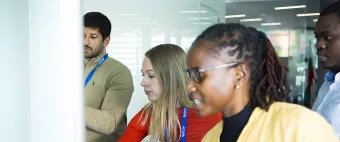International Women’s Day : A discussion on the Women Peace and Security Agenda

International Women’s Day : A discussion on the Women Peace and Security Agenda
Ahead of International Women’s Day, we discussed this year’s theme « Invest in Women: Accelerate progress” and the Women Peace and Security (WPS) Agenda more broadly with Fleur Heyworth, Head of Gender and Inclusive Security at the GCSP, and two inspiring women alumnae and partners: Assal Mahmoud, Associate Officer on Women Peace and Security at the Cairo International Centre for Conflict Resolution, Peacekeeping and Peacebuilding (CCCPA) and 2023 alumni of the New Issues in Security Course; and Adelaide Ekua Otoo, Senior Programme Officer at the Women Youth Peace and Security Institute (WYPSI) at the Kofi Annan Peacekeeping Training Centre (KAIPTC), and 2018 alumna of the Inspiring Women Leaders course.
We wanted to find out what the CCCPA, KAIPTC and the GCSP are doing specifically to invest in women, and if investment in women in enough to accelerate progress? We also asked our community of experts what developments they are seeing with the WPS Agenda and finally, what would they like to see from the Pact of the Future.
What are you doing to invest in women? Is it enough to accelerate progress?
Assal - Cognizant of the centrality of capacity building to unlock the transformative potential of women’s leadership, CCCPA has been at the forefront of building the capacities of African and Arab women cadres on a range of peace and security issues. While investing in women through capacity building has led to major breakthroughs in advancing the implementation of the WPS agenda, it is in no way enough to accelerate progress towards realizing the full promise of this agenda. As an illustration, the current challenges in enhancing the participation of women in peace processes can be attributable among other factors to the tendency to treat capacity building for women as the silver bullet for addressing their historically low participation rates in those domains. Capacity building is unquestionably needed to level the playing field for women’s participation by providing opportunities for skills development; however, it only addresses the issue of supplying equipped women, without necessarily putting forward tangible solutions towards creating the demand for these women. Mindful of this dilemma, CCCPA has been taking active steps towards ensuring that its capacity building interventions are not only an investment in women’s knowledge and skills, but also a push towards more favorable conditions for women’s participation in peace and security.
Adelaide – The KAIPTC -Women Youth Peace and Security Institute has also been investing in women, particularly grassroots peace builders and women working in peace operations. Partnerships have been key to making this happen, and as an ECOWAS centre of excellence for peacekeeping training and an African Union recognised training Centre, we have collaborated with global, regional, national and grassroots actors to advance women and girls rights and promote women’s voices in peace processes. We have seen over the years that the Inspiring African Women Leaders Peace and Security Programme (organised in partnership with the GCSP and GIZ) has advanced African women’s grassroots action and WPS implementation. The programme then strengthens the relationships between different women peace actors, who all benefit from one another’s knowledge and experience, from military to academia, government and community actors. Post-course, the women continue to support each other - amplifying one another’s voices and influence and finding synergies as they drive change in their communities and organisations. Since 2023, the institute has promoted Youth Peace and Security as part of its mandate, and we are committed to promoting young women’s leadership and ensuring intergenerational knowledge exchange – and ultimately more inclusive processes and sustainable peace and security in Africa.
Fleur – Just like the CCCPA and the KAIPTC, the GCSP is also supporting women leaders. To date, we have facilitated leadership courses for over 400 women working in peace and security globally, and achieved women’s equal or slight majority participation in many of our other courses, including for UN peacekeepers and our European Security Course.. Many report the benefits to their own skills, confidence and resilience which gives us hope for the future, but, as Assal highlighted, we also have to look at the system. In addition to the needing to ensure the ‘demand’ as well as ‘supply’ the global landscape to advance gender equality is getting more challenging. Increasing militarisation and securitisation resulted in spending on arms passing 2.24 trillion USD in 2023. This is amidst increasing economic inequality, threats to democracy and civil society space and push back against women’s equal rights. Investing in women is critical – and in addition to the capacity building that we do as centres, we need to also ensure that women are supported by essential services and social protections and protection of their human rights. Social norms which see women undertake the majority of care worldwide, continue present a barrier to political and economic equality, and I would echo the call of some leaders such as Rebecca Greenspan of UNCTAD, who are calling for a care society in which everyone plays their part in caring for those in need. So yes we are investing in women, and we need governments and other actors to invest in shifting systems more.
What developments are you seeing with the WPS Agenda?
Assal – The current security landscape and the resulting humanitarian crises are causing shifts in funding approaches. In addition to what Fleur stated above, we are seeing a move towards immediate and short-term aid centric modalities. This presents the WPS Agenda with an important challenge in terms of achieving its long-term objectives. In its essence, the WPS Agenda is a long-term endeavor that entails investing in structural changes, with the view of instilling the foundations of peace and prosperity. Therefore, there should be a renewed commitment towards the sustainable and predictable financing of the Agenda, stemming from the awareness of the long lasting impact of WPS investments.
Adelaide – In West Africa, we have seen substantial gains through National Action Plans (NAPs), with 15 out of 16 countries having developed them. These are critical national tools for WPS implementation at the state level, providing framework for WPS activism and identifying national priority areas for WPS on topics ranging from conflict mediation to violent extremism. At the African Union Commission, the Office of the Special Envoy on WPS developed the Continental Results Framework by for WPS NAP monitoring and reporting, providing a continental outlook on WPS implementation, success and challenges. The NAPs have traditionally been foreign donor funded, and continued support will be critical. At the same time, African governments and private sector actors need to increase direct budgetary support for WPS NAP implementation. Advancing NAPs to meet the evolving peace and security landscape in the West Africa and the Sahel region will also require research and investment. Climate change, migration and cyber security challenges all intersect with women’s rights but research is limited. Finally, I would like to highlight that the current surge in coups in West Africa presents the need now more than ever to promote women leadership and active participation in decision making, offering among other efforts opportunity promote inclusivity in governance. To this end, the WPS agenda can be leveraged to promote constitutionalism and support preventive measures to ensure that countries are not drawn into coups, and we need to explore how this can be done more effectively – both to protect democracy and women’s rights.
Fleur – Globally we are seeing a simultaneous rise in countries adopting a feminist foreign policy who are pushing a systemic progressive approach, and retreat from others who challenging previously agreed language and priorities on women’s rights within multilateral fora. The WPS Agenda has stagnated in the Security Council. I believe that we can make progress by bringing the WPS agenda back to human rights and ending the artificial divide between civil, political, economic, cultural and social rights – and seeing its huge potential to prevent violent conflict, as highlighted by Adelaide. We can build on the WPS Agenda architecture which creates bridges across the global, regional, national and local actors to increase cooperation and more inclusive peace and security. The GCSP recently launched an Impact Group on Women, Peace and Security within the International Gender Champions network, which aims to create a platform for increased leadership and cooperation around the Agenda, and ensure that it is prioritised here in Geneva at this critical time.
What would you like to see from the Pact for the Future?
Assal - The Pact for the Future represents a critical juncture for the WPS Agenda, especially in terms of considering existing WPS instruments and frameworks in light of the evolving peace and security landscape. We should seize this opportunity to create conditions for successful WPS implementation through making the WPS Agenda more fit for purpose for today’s rapidly evolving global landscape.
Adelaide - The Pact for the Future presents an opportunity to strengthen existing initiatives which have proven successful in addressing gender mainstreaming in international peace and security. This includes supporting for grassroots action, especially women grassroots peacebuilders, promoting women in peace operations and youth engagement including young women in peacebuilding and conflict prevention. Additionally, it should enhance commitment to financing gender mainstreaming processes though WPS and YPS funding, particularly in the context of emerging security challenges.
Fleur – In addition to what Assal and Adelaide said, I would like to see WPS not just as a tick box stand-alone segment but integrated throughout, addressing traditional and emerging threats and opportunities, governance structures and the life cycle of conflict. Finally, financial investment to back up the words, or the words will remain just intentions, without action and real meaning.

